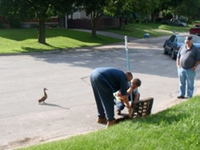
This morning, a duck stood at the side of the road in front of my house. She looked like a miniature housewife in a plain brown cotton housedress - along with that “slipping” belly that comes with age and babies. I walked down my driveway towards her and she didn’t leave her spot, didn’t fly away, stood her ground, hovered at the edge of the grate cover of the storm sewer.
The duck wasn’t quacking, so I suspect she had been there a while and was now overwhelmingly perplexed, that feeling you get when you just don’t know what to do anymore, how to solve the problem. I had the same feeling at that very moment. Only the day before I had stopped the car to let a duck with a long single-file line of ducklings cross a major intersection. She led them across four lanes and disappeared into the tree-scape behind a Wendy’s fast food outlet.
It’s the season of offspring. I knew what was down that storm sewer, and I didn’t want to know, because I doubted I could do anything about it. I’m generally an optimist, but in this situation, I didn’t see any reason for optimism. To make matters worse, that duck wasn’t going away either; she’d stay there until she knew she could do nothing more, and then stay longer, such was the strength of imprinting.
I peered down the grate. Sure enough, there were her ducklings, swimming in circles in the water at the bottom of the rain sewer, a good ten feet below the road.
My neighbour across the road, Fabian, came off his porch to join me. He knows most everything that happens in our neighbourhood, even more so now that he is retired.
So there we were, the three of us, Fabian, Mother Duck and me. And still mother duck did not leave.
“Her ducklings fell down through the grate,” I said to Fabian. “She must have led them right over it, what are the chances?”
Fabian wasn’t surprised about the duck, nor the ducklings. Seems he knew about them already.
I never know these community things. I don’t even know the names of my neighbours two houses up on either side of my house, and I’ve lived here for eighteen years. Fabian knows the names of everybody on the whole block, probably knows more than their names.
“The duck laid a clutch of ten eggs in a yard up the street,” Fabian said. “Been sitting on them, wonder why she left to come down to our end of the crescent?”
I shrugged. “Searching out water? I suspect she led her ducklings to the storm sewer. Ducklings need water.”
I need water.
I share this need for water with ducks and ducklings all the time - at the conservation areas where I kayak, and on the Grand River - not in the suburbia of my neighbourhood. Those other ducks chase me away if I get too close. I’ve had the strange experience of a large Canada Geese escorting my kayak from her nesting territory - goose and paddler side by side - not unlike an air force jet escorting a plane carrying a terrorist. She kept constant pace with me - the harder I paddled the faster she paddled her feet.
But what to do, right now about the ducklings in the sewer?
I asked my husband, who works for a neighbouring municipality. He’s a city worker, so I shouldn’t have been surprised when he said: “Call the City.”
But I was surprised, and cynical, too. “The City? Who in the City?”
“Public Works.”
“Public Works will come out to rescue ducklings from a storm sewer?“
But with no other option on the table, I called the City of Kitchener. It was 7:30 in the morning, and yet someone answered the phone, already at work. Within ten minutes, a truck came by, and out came two city workers to join Fabian, the mother duck, and me at the side of the road.
And still that duck stood her ground. Even when I snapped the photos. Even when a school bus drove by. Even when those two city workers stood over the grate, and then wrangled it off, and took a very long net and scooped up three ducklings. Deposited them on my front lawn, all within two minutes or less.
Only then did mother duck make her exit, wasted no time hanging around any longer. She corralled the ducklings and off they hurried, all in a line, to disappear under the heavy cover of flowers in my next-door neighbour’s garden – Mary – her name I know.
Instead of packing up their nets and leaving, the two workers put their ears down close to the storm sewer. “There’s another cheeping,” one said, and, they found a duckling in the adjacent storm sewer. They swooped that one up in their net, and turned the net over near the clump of flowers, and then the mother duck hustled it away too. The City workers bent over again, ear to the sewer. Silence. No cheeping. Fabian had said there were ten eggs…
I don’t know if ten eggs hatched, if ten ducklings headed down the road that morning, or if only four made the journey. “Sometimes you can’t save them all,” the City worker said to me.
“You’ve done this before?” I asked.
“Yesterday,” they said. “The same situation. A happier result here.”
Then they left.
And I’m left too, left with a few thoughts - about that mother duck, how strong nature’s bond, the genetic imprinting. Although physically agitated by our presence, and by the absence of her ducklings from her side, she stayed close to us, in spite of the danger, the need to gather her ducklings overriding her fear. And when she had those ducklings back again, she hurried them out of there, nature again kicking in, and those ducklings followed her, the imprinting just as strong from their viewpoint. I felt less agitated myself, knowing that the mother duck’s agitation had subsided, that she felt eased that she was doing what she was supposed to be doing, that nature imprinted her to do, felt the ease in her body.
And then I thought about the bigger picture - it’s that same imprinting, call it deep caring if you wish, that keeps life going. Literally. At every level. And then I thought about those City workers – two guys who cared beyond the job description.
It’s been two days and I haven’t since seen the mother duck and her ducklings. I hope they found water, real water.
